

Exorcisms in the Catholic Church. Holy Eucharist Printer-Friendly Non-Vatican Interpretation of certified as being possessed by authorized Catholic priests. Only Catholic priests who are both legally and morally ordained and are faithful to the teachings of Sacred Scripture, as validly understood through the legitimate moral authority of the Church, and who remain spiritually sound should attempt an exorcism. Instead; Praying the Exorcism Prayer is encouraged. for those recognizing satanic activity in relation to themselves: Immediately reject any and all types of unnatural insights whether they occur in a dream or while in a waking state.
Order of Malta. Official visit of the President of Liberia to the Sovereign Order of Malta Rome, 05/04/2014 Ellen Johnson Sirleaf received this morning by Grand Master Fra’ Matthew Festing The President of Liberia, Ellen Johnson Sirleaf, was received this morning by the Grand Master of the Sovereign Order of Malta, Fra’ Matthew Festing at the Magistral Palace.

Order of Malta (American Association) Young And Catholic. NEWS.VA. Catechism of the Catholic Church. Catechism of the Catholic Church - PART 3 SECTION 2 CHAPTER 2 ARTICLE 6. You shall not commit adultery.113 You have heard that it was said, "You shall not commit adultery.
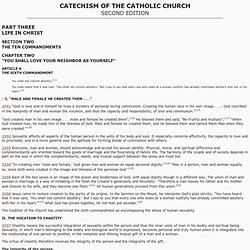
" But I say to you that every one who looks at a woman lustfully has already committed adultery with her in his heart.114 "God created man in his own image . . . male and female he created them";116 He blessed them and said, "Be fruitful and multiply";117 "When God created man, he made him in the likeness of God. Male and female he created them, and he blessed them and named them Man when they were created.
"118 The tradition of the Church has understood the sixth commandment as encompassing the whole of human sexuality. Superstition of Christianity (Quotation) Quotation: "I have examined all the known superstitions of the world, and I do not find in our particular superstition of Christianity one redeeming feature.
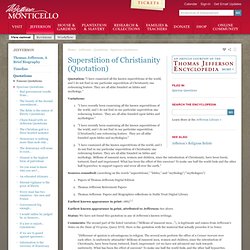
They are all alike founded on fables and mythology. " Variations: John Shelby Spong. Background[edit] Spong was born in Charlotte, North Carolina and educated in Charlotte public schools.
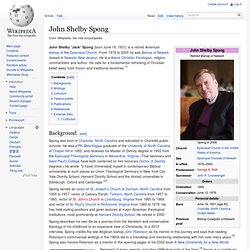
He was a Phi Beta Kappa graduate of the University of North Carolina at Chapel Hill in 1952, and received his Master of Divinity degree in 1955 from the Episcopal Theological Seminary in Alexandria, Virginia. (That seminary and Saint Paul's College have both conferred on him honorary Doctor of Divinity degrees.) He wrote: "[I have] immerse[d] myself in contemporary Biblical scholarship at such places as Union Theological Seminary in New York City, Yale Divinity School, Harvard Divinity School and the storied universities in Edinburgh, Oxford and Cambridge.
Spong is the cousin of former Virginia Democratic Senator William B. A play about the life of Spong, called A Pebble In My Shoe, has been written by Colin Cox and produced by Will & Company. Writings[edit] His views on the future of Christianity are, "...that we have to start where we are. (welcome) johnshelbyspong.com. The American Cult of Consumerism.
A Black Friday mob of frenzied shoppers breaks down the doors of a Walmart on Long Island, N.Y., and tramples an employee to death.
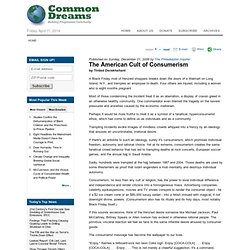
Four others are injured, including a woman who is eight months pregnant. Most of those condemning the incident treat it as an aberration, a display of craven greed in an otherwise healthy community. One commentator even blamed the tragedy on the severe pressures and anxieties caused by the economic meltdown. Perhaps it would be more fruitful to treat it as a symbol of a fanatical, hyperconsumerist ethos, which has come to define us as individuals and as a community. Trampling incidents evoke images of mindless crowds whipped into a frenzy by an ideology that arouses an uncontrollable, irrational desire. If there's an antidote to such an ideology, surely it's consumerism, which promises individual freedom, autonomy and rational choice.
Sadly, hundreds were trampled at the hajj between 1987 and 2004. The consumerist message has become the wallpaper to our lives. Dominicana. Thinking God's Thoughts: Craig Destroys Harris. So the debate is over.

I tweeted along with it instead of doing it here, so you can check what I and others said as the debate progressed here. Craig demolished Harris, who was unable to refute Craig's devastating critique of his version of utilitarianism. Craig showed how 1) God provides a sound foundation for morality and, 2) that without God, no sound ground of morality would exist. He pointed out that Harris was simply redefining morality to be identical to human well being, but Craig not only showed how this was entirely insufficient and arbitrary, but also how it was logically incoherent. Harris really blew it by completely ignoring the topic of the debate in his second speech and just talking about completely irrelevant red herrings. Another great showing for Dr. Summary of Craig vs Harris Debate. Possible Worlds: Review of Craig vs. Harris Debate.
The William Lane Craig-Sam Harris debate promised to be a better affair than last week’s Craig-Krauss debate, and it did not disappoint.
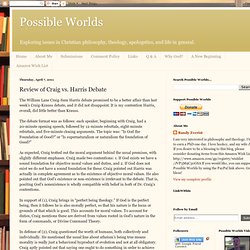
It is my contention Harris, overall, did little better than Krauss. The debate format was as follows: each speaker, beginning with Craig, had a 20-minute opening speech, followed by 12-minute rebuttals, eight-minute rebuttals, and five-minute closing arguments. The topic was: “Is God the Foundation of Good?” Or “Is supernaturalism or naturalism the foundation of Good?” As expected, Craig trotted out the moral argument behind the usual premises, with slightly different emphases.
Possible Worlds: Review of Craig vs. Krauss Debate. Disclaimer: I am biased towards Dr.
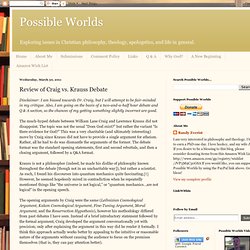
Craig, but I will attempt to be fair-minded in my critique. Also, I am going on the basis of a two-and-a-half hour debate and Q & A section, so the chances of my getting something slightly incorrect are good. The much-hyped debate between William Lane Craig and Lawrence Krauss did not disappoint. The topic was not the usual “Does God exist?” But rather the variant “Is there evidence for God?” Krauss is not a philosopher (indeed, he made his dislike of philosophy known throughout the debate [though not in an uncharitable way]), but rather a scientist. The opening arguments by Craig were the same (Leibnizian Cosmological Argument, Kalam Cosmological Argument, Fine-Tuning Argument, Moral Argument, and the Resurrection Hypothesis), however his methodology differed from past debates I have seen.
Letter to a Christian Nation: AFTERWORD.